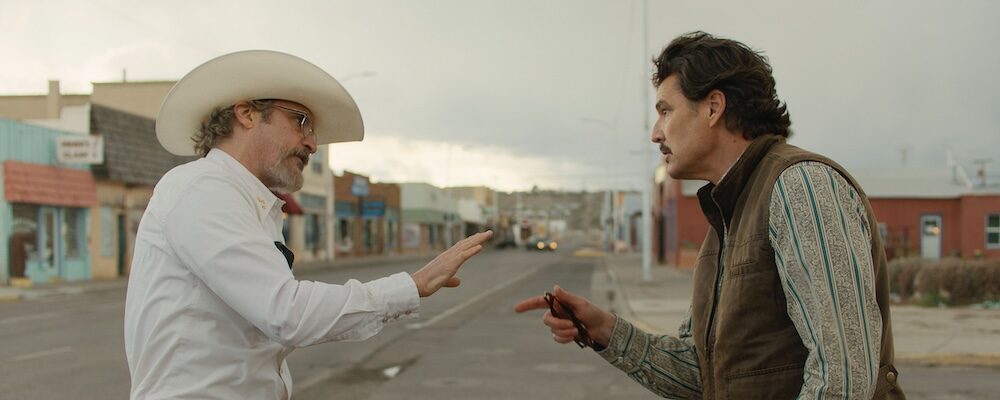‘Eddington’: Ari Aster’s Bonfire of Pandemic Paranoia and Scattered Madness
Alci Rengifo
In the early stages of Covid, America became so chaotic that it is not surprising Ari Aster feels an urge to somehow comment on it all. Aster’s “Eddington” can’t decide on what aspect of American zaniness to stick with, so it aims for multiple targets using the typical setting of a small town. With social media virtually connecting everyone, it is easy to believe you are at the center of the world even in the most remote corner of a vast country. This was glaringly obvious during that tumultuous year of 2020, when a pandemic, lockdowns, politics, social protests and media coalesced into a storm still defining much of how we function as a society. Aster has the ingredients here to be quite provocative, but he settles for just evoking a crazy mood.
Aster reunites with Joaquin Phoenix, casting him as Joe Cross, the sheriff of Eddington, New Mexico. The population is a mere 2,634. It is May 2020 and the Covid-19 pandemic is well into overturning daily normality. Like all small towns, there are long histories and old tensions between residents. The Mayor is Ted Garcia (Pedro Pascal), who used to date Joe’s wife, Louise (Emma Stone). Ted, currently running for reelection, is keen on enforcing the face mask mandates that sparked so much debate. Joe would prefer not to wear a mask. A showdown at a supermarket pushes Joe to decide to run for Mayor as well. Backed by his deputies, Michael (Micheal Ward) and Guy (Luke Grimes), Joe initiates his campaign and starts grabbing ideas from the internet’s conspiracy-obsessed zones. Tensions rise when local teens also get caught up in the Black Lives Matter movement following the killing of George Floyd.
What Aster has made is akin to a collage of various attitudes and social strains boxed into this small town. It also marks a change in direction for the filmmaker, who is best known for two intense horror thrillers, “Hereditary” and “Midsommar,” and the wild psychological trip “Beau is Afraid.” This new film is Aster attempting to try a form of social satire. The basic details can be funny, like Joe plastering his squad car with banners touting conspiracy theories. A local teen, Brian (Cameron Mann), crushes on a girl named Sarah (Amélie Hoeferle) who becomes heavily involved in BLM, espousing white guilt. She in turn gets close to Ted’s son, Eric (Matt Gomez Hidaka), who speaks the activist language and helps her organize protests. For Brian this means needing to force himself to pretend he knows what they’re talking about when discussing anti-colonialism. Joe is even more confused considering that despite the town seeming so isolated from such heavy issues, fear spreads of Antifa infiltrators. With everyone doom scrolling constantly, it’s no surprise paranoia begins to spread faster than Covid.
Had Aster truly focused on the whole angle of a mayoral race becoming a magnet for every hot button issue of 2020, this could have been a funny neo-Western in the style of Robert Altman. Alas, especially near the half-way point, the structure gets too scattered. The screenplay by Aster has no thesis. It just seeks to splatter around some allegory or representation of one theme after another. Louise becomes entranced by an internet guru, Vernon (hilariously played by Austin Butler), to the consternation of Joe and her difficult mother, Dawn (Deirdre O’Connell). The performances in themselves are funny but what’s the point? Is it meant to just be a snapshot of the alternative belief systems people have been seeking? The same goes for Aster’s treatment of BLM. Does he think the kids are fools for becoming so involved in a grievance that doesn’t seem to affect Michael, apparently the only Black character in the whole movie? At one point Sarah asks Michael in public why he isn’t siding with them when it should be his struggle. It’s an observation by this film, not a commentary or even satire. Luke Grimes’ deputy, Guy, at times seems to represent the right-wing response to BLM as he condemns the footage of faraway protests in the news.
The plot truly unspools when Aster then swerves into an unnecessary twist involving murder and cover-ups. This fully obscures the more intriguing angles he almost builds revolving around the social differences in Eddington. Joe is the underdog sheriff at first, running against Ted’s better oiled political operation that can afford slick TV advertisements. Even in a place as small as this, the better off look down at the plebs. Yet, it’s hard to sympathize with Joe considering the conspiracy rabbit holes he falls into. We then have to wonder if the characters’ paranoia was indeed warranted when Aster seems to suggest a real Antifa militant arrives via private jet to spread havoc because of an internet post. Once again the flaw is that Aster is showing a lot but not saying much. It’s a postmodern experiment using buzzwords.
Because Aster is such a talented filmmaker and the cast is strong, “Eddington” is not boring to watch. It still has a good pace and Joaquin Phoenix again taps into that maddened vulnerability that has become his trademark. Pedro Pascal is good as a proud man who pretends to be nice to Joe out of having decent manners. Cinematographer Darius Khondji turns their world into a rugged, stark little place with stormy New Mexico skies that give way to rich sunshine. Certain images on their own almost do a better job at achieving a purpose than the narrative itself. We can believe everyone on screen could be found in a rural corner of the Southwest. What is missing is a clear purpose to why Aster has conjured them, unless the whole point is that he is just as baffled as many of us about the timeline we have been living through.
“Eddington” releases July 18 in theaters nationwide.

